Constructing the Solfeggio Teaching Plan Using Orff Method for Teaching Students at College of Art, Henan University of Economics and Law, China
Main Article Content
บทคัดย่อ
This article aims to explore the application and effect of Orff method in solfeggio courses in colleges and universities. Sight-singing and ear training is a basic course in music education in colleges and universities, which is of great significance for cultivating students' musical skills and literacy. However, traditional solfeggio teaching methods often focus too much on skill training and ignore students' subjectivity and creativity. As an advanced educational concept, Orff method emphasizes the originality, comprehensiveness, creativity and improvisation of music, and provides new ideas and methods for solfeggio courses in colleges and universities. More and more teaching methods are being used. Introduced into music education, Orff method has been widely welcomed for its unique ideas and methods. Through empirical research, the results show that the Orff method has a significant effect in improving students' solfeggio abilities and cultivating music perception and creativity.
In order to verify the actual effect of Orff method in solfeggio courses in colleges and universities, this study was explored through qualitative research methods and quantitative research methods. In the qualitative research part, the researcher conducted interviews with experts in the field of Orff method to summarize and analyze the benefits of Orff method in college music teaching and how to use it in solfeggio classes. Then, relevant teaching plans were created by summarizing the opinions of experts. In the quantitative research part, a 16-week experimental teaching was carried out for the students participating in the study using teaching plan. Through comparative analysis of the students' scores before and after, it was concluded that the students' solfeggio scores improved after the study (M=87.5). It is better than before learning (M=65.23), and the paired T-test proves that there is a significant difference in the data, which is statistically significant (p<0.001). This shows that the Orff method has a significant effect in improving the teaching quality and students' solfeggio courses in colleges and universities. Orff method has important application value in solfeggio courses in colleges and universities. By using Orff method, teachers can better stimulate students' interest in learning and creativity, and improve students' music skills and literacy. In the future, the researchers recommend further promoting the application of Orff method in music education in colleges and universities to provide strong support for cultivating more talents with innovative spirit and artistic literacy.
Article Details
เอกสารอ้างอิง
Chen, L. (2019). Reflections on the Status Quo and Development Trend of college Music Education.(eds.) Proceedings of the 2019 Southland Expo Symposium. School of Music, Dalian University, (4), 235-237.
Davies-Splitter, S. & Splitter, P. (2006). Get Orff on Singing. http://www.vosa.org.
Li, L. (2018). The combination of basic music theory and solfeggio in music teaching. Music of the North, (09), 184.
Silsbury, E. A. (1968). Reports from Churchill Fellows (i) Learning to teach Orff. Australian Journal of Music Education, 2, 40-43.
Tong, Y. (2019). Discussion on the cultivation of musical ability of college students in solfeggio and ear training teaching. Music of the North, (09), 151-152.
Tian,M. (2019). A study on the cultivation of improvisation ability in solfeggio ear training courses in universities. Shaanxi education (higher education), (6), 76-77.
Yan,X.(2019). The importance of Orff Music Teaching Method in college Music teaching.
Zhang,X. (2020). Training of comprehensive teaching ability of solfeggio and ear training in colleges and universities. Theatre House, (31), 83-84.
Zhang J. (2014). Write good music teaching cases as a conscientious person. New Course learning, (10).

